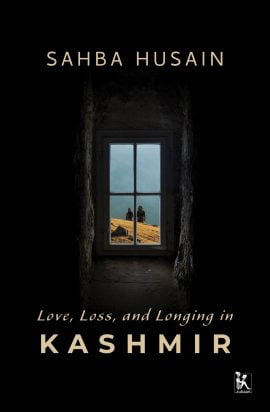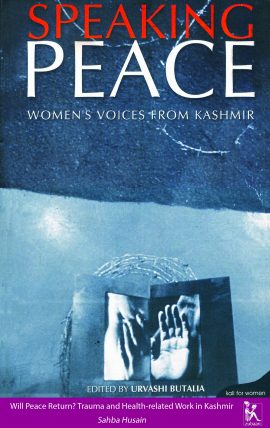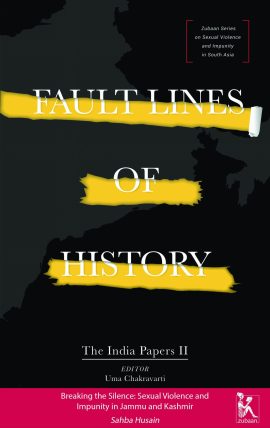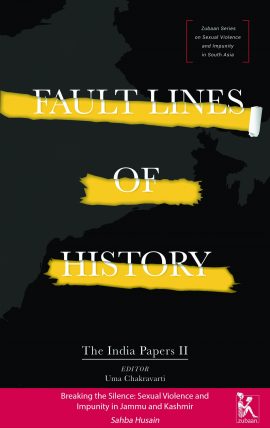No products in the cart.
Return To Shop
Log in / Sign in
Login
Register
Filter by price
Love, Loss, and Longing in Kashmir
₹ 475 – ₹ 595Select format This product has multiple variants. The options may be chosen on the product pageThis year, Zubaan commemorates 21 years as a feminist organisation. Over these years, we’ve delivered bundles of treasures across continents. However, in the past years, specifically the lockdown, many of our treasured books took a backseat in the warehouse and their bright, crisp pages turned yellow. But the content of every book is still intact, carrying opinions, voices, equal opportunities, ample love, and the courage to build a diverse and empathetic community.
Titled Warehouse Wonders, these books remain cherished and valuable for reading despite their age and wear.
Come, join us in our journey of preserving books which have been handcrafted brilliantly but haven’t reached our voracious readers.
Find the details about each book here:
zubaanbooks.com/shop/love-loss-and-longing-in-kashmir/
zubaanbooks.com/shop/freedom-fables-satires-and-political-writings/
zubaanbooks.com/shop/the-search/
zubaanbooks.com/shop/the-empty-room/
We hope you enjoy this bundle of joy!
Please note: We are shipping these orders by post. Please allow 10-14 business days for delivery. These copies cannot be returned.
In this personal and passionate account, activist and researcher Sahba Husain documents her deeply engaged and empathetic involvement with the politicised terrain of Kashmir. As she meets people that she speaks with and, more importantly, listens to, she begins to question her own ‘Indian’ identity. Recognizing the anger, despair and helplessness of a people caught in conflict and violence, Husain forms deep friendships during her time working in the state.
It is these relationships that form the backdrop of this book, in which Husain focuses on certain key areas: the health of a people, militancy and its changing meanings for local people and the state, impunity and the search for justice, migration and the longing for homes left behind, and women’s activism in the faultlines of nation-state and community. A book of surprising beauty in its engagement with human relationships, of love for a land and a people and of hope for a future free of violence, Love, Loss, and Longing in Kashmir is a compelling and necessary read.
PUBLISHER’S NOTE: As this book goes to press, there is news of the abrogation, by the Indian government, of Article 370 of the Indian Constitution that grants special status to the state of Jammu and Kashmir. Major changes that affect the lives of people in Kashmir are being put in place. Currently, there is a heavy presence of the armed forces, curfew is in place, telephone and internet lines have been suspended, people are in fear and there is huge bewilderment, confusion, anger. No one knows what the future will hold. This book, the result of long years of engagement with Kashmir, ends on a note of hope. It is our hope and belief too that whatever the future holds, it is the people of Kashmir who will shape it for their state and their world.
SAHBA HUSAIN is an independent researcher and women’s rights activist. For the last two decades, she has travelled extensively in Jammu and Kashmir, documenting the social consequences of armed conflict, mass violence and militarization on individuals, families and communities, with a special focus on women. Her earlier research focused on problems of working women in the organized and unorganized sectors in several states of India and on the impact of development policies on women’s social, political and economic status.
Sahba Husain, in her capacity as a consultant with Oxfam, worked in Kashmir at a time when the conflict was already 15 years old. This essay discusses her experiences as a part of the Violence Mitigation and Amelioration Project, where her task was to examine the psychological impact of violence on people’s lives as well as the echoes of such violence. It brings to the forefront the increasing rates of psychological disorders and cases of suicide, and the utter paucity of resources for dealing with the deteriorating mental health situation in the region. The essay’s observations on trauma and health stem from the author’s empirical study of the population of Kashmir, for whom life has been rendered uncertain. Husain explores how faced with loss, suffering and prolonged stress, women in the region have become susceptible to depression and anxiety too, but often cannot seek treatment due to social constraints. By capturing certain experiences of the people, the essay evokes the drastic transition that has taken place in their lives after militancy and has left Kashmir in the dark. The refrain of fear that is pervasive in the region only affirms that no one, irrespective of age, gender or class, has escaped the massive impact that militancy and the AFSPA have had. Husain’s piece is a reflective one as she discusses the challenges she faced during her work, which were integral to her subsequent disillusionment with the Indian state . Her essay, too, shatters a certain monolithic image of Kashmir and sheds light on the psychological trauma and health issues that people from the Valley face. It is, finally, a reminder of the patience, endurance and strength that women have displayed in their desire for justice, and above all, peace.
Often cited as the most militarised zone in the world, the Kashmiri landscape is full of contradictory narratives. This essay intervenes in this crossfire of accounts in order to investigate the voices of survivors of sexual violence in the region.
This essay illustrates how sexual violence in the context of Kashmir takes on another layer of meaning as a deliberate strategy employed by the armed forces. It targets both women and men and has a bearing on their daily lives that are subsumed under the shadow of militancy. The events of Kunan Poshpora and Shopian, then, are only a few out of many incidents which speak volumes about the lack of accountability and the culture of silence in the terrain.
As a researcher and activist, Sahba Husain looks at the turning points in the narrative of sexual violence in the region and its emergence out of the margins. Much of the analysis in the essay also stems from personal accounts of survivors who have different allegiances and religious backgrounds, which has affected them differently and has allowed the author to delve deeper into their varied experiences. The aftermath of sexual violence and the challenges it poses in a patriarchal society, especially in the anxiety-ridden conflict zone, broaden the scope of engagement with the very notion of this kind of violence. The essay examines these concerns, as it initiates a move towards a more inclusive and incisive way of thinking about impunity and silenced narratives in the Valley.
Often cited as the most militarised zone in the world, the Kashmiri landscape is full of contradictory narratives. This essay intervenes in this crossfire of accounts in order to investigate the voices of survivors of sexual violence in the region.
This essay illustrates how sexual violence in the context of Kashmir takes on another layer of meaning as a deliberate strategy employed by the armed forces. It targets both women and men and has a bearing on their daily lives that are subsumed under the shadow of militancy. The events of Kunan Poshpora and Shopian, then, are only a few out of many incidents which speak volumes about the lack of accountability and the culture of silence in the terrain.
As a researcher and activist, Sahba Husain looks at the turning points in the narrative of sexual violence in the region and its emergence out of the margins. Much of the analysis in the essay also stems from personal accounts of survivors who have different allegiances and religious backgrounds, which has affected them differently and has allowed the author to delve deeper into their varied experiences. The aftermath of sexual violence and the challenges it poses in a patriarchal society, especially in the anxiety-ridden conflict zone, broaden the scope of engagement with the very notion of this kind of violence. The essay examines these concerns, as it initiates a move towards a more inclusive and incisive way of thinking about impunity and silenced narratives in the Valley.
Categories
Filter by
Product tags
academic
AFSPA
Bangladesh
caste
conflict
Dalit women
e-essays
feminism
feminist
feminist fiction
Fiction
gender
gender studies
health
history
impunity
India
Kashmir
legislation
Literary Fiction
Memoir
Nagaland
New Editions
Non-Fiction
Northeast India
Pakistan
Poetry
sexual violence
Short Stories
sociology
South Asia
state impunity
SVI
SVI Project
Top Ten
translation
violence
violence against women
warehouse wonders
women's activism
women writer
women writers
young zubaan
zubaanbooks
Zubaan Classics
Contact Us
© Zubaan 2019. Site Design by Avinash Kuduvalli.
Payments on this site are handled by CCAvenue.










